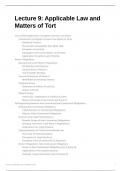Lecture notes
Full set of notes for Commercial Conflict of Laws
- Institution
- University Of Southampton (UOS)
Lecture 3-9 (the relevant ones for exam) with full case summaries where relevant. Structured on tests to be applied in problem question. Obtained 75 on my exam.
[Show more]



